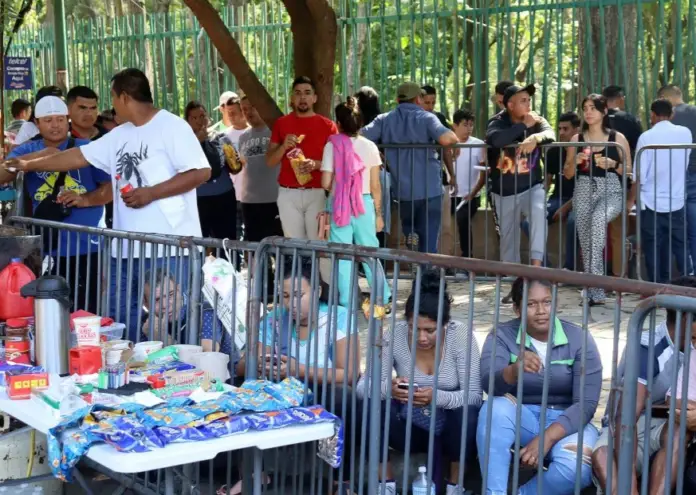
Migrants fear that, after Donald Trump’s victory in the US elections, they will be stranded on the southern border of Mexico, where the government of Claudia Sheinbaum promises that there will be job opportunities and industrial development despite immigration restrictions.
In Tapachula, the main city on the border between Mexico and Central America, concern is growing among migrants, such as Ecuadorian Pablo Carrera, because the Mexican government could restrict the transit of foreigners after Trump’s victory last week.
“As a person, as a human, we should be given free transit to be able to continue advancing to the border, we left our country with that goal, but there is a lot of denigration towards migrants,” Carrera told EFE.
The Mexican border
On the first day of Sheinbaum’s mandate, on October 1, soldiers killed six migrants from Egypt, El Salvador and Peru in Chiapas, a state on the southern border, after the deployment of 36,000 members of the Armed Forces for immigration tasks during the presidency of Andrés Manuel López Obrador.
In addition, the southern border of Mexico, where thousands of migrants are waiting to enter the United States, became the most unsafe area of the country in October, as almost 92% of its inhabitants perceive insecurity amid the violence of organized crime, according to the National Survey of Urban Public Security (ENSU) of the National Institute of Statistics and Geography (INEGI).
“We must respect laws and regulations in each country, which we have been doing, but also that they help us with greater security because of what is happening in Mexico,” argued Carrera.
“Humanitarian” strategy and development
Sheinbaum defended this Monday that there is a “humanitarian” strategy, of investments and industrial development to address migration on the southern border, while her Government reports a 76% drop in the daily detention of migrants on the border with the United States since last December.
“The objective is to generate a project, beyond the incentives and waiting for the investment, to really generate a comprehensive project for that area that allows work, obviously, for the inhabitants of Chiapas, but also to contain migration in the south of our country,” the president explained in her morning conference.
The next head of the Secretariat of the Southern Border of the Government of Chiapas, María Amalia Toriello, asserted that there will be opportunities for migrants.
“That is the commitment of the Secretariat, to promote the development of what is the southern border. It involves the port, the border and the municipalities that make up the southern border and in terms of migration it goes hand in hand,” she said in an interview.
“If we achieve this development, we will ensure that migrants receive a dignified treatment for the time they are here, we do not know how long,” he added.
They demand respect for the human rights of migrants in Mexico
Although the detention of undocumented people on the border with the United States has decreased, Mexico registered a record of more than 712,000 irregular migrants through the country in the first half of the year, an increase of 193% year-on-year.
Fearing pressure from Trump, activist Rafael Alegría López, defender of migration on the southern border, asked the new Mexican government “to offer different measures that guarantee the rights of migrants, that do not violate them.”
He told EFE that it is, above all, about “giving opportunities to those who want to realize an opportunity for life in Mexico, also as a second plan to be able to develop it through a platform that improves the control of migratory access, of what type of citizen comes in a context of mobility.”
Source: efe






